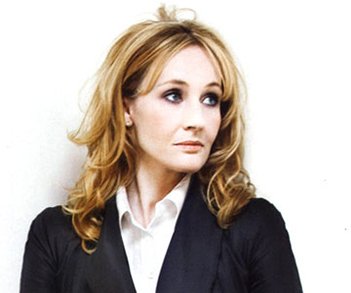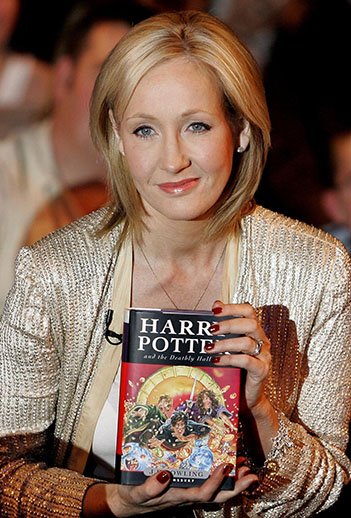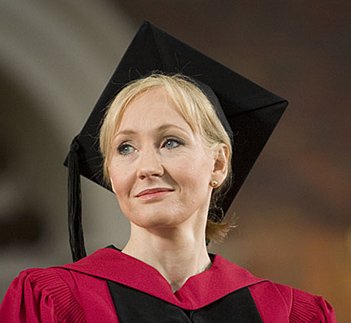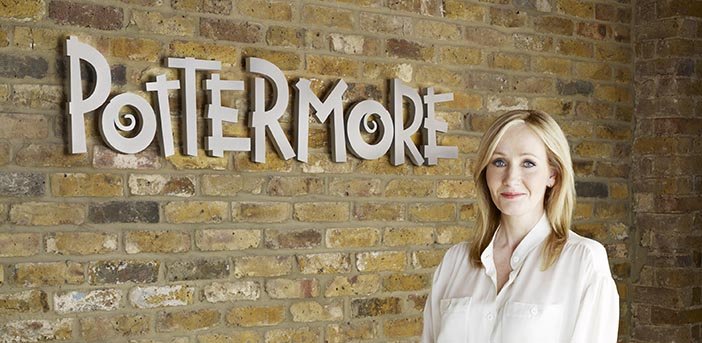The Open Book: J.K. Rowling
My favourite author was a topic I never used to discuss that often. People would list off great names such as Joyce, Dickens, Tolkien, Hemingway, or Twain, and have heated debates about great pieces of literature that I have never read. I felt compelled to keep my favourite author a secret, too afraid of what people would say when they found out that mine is, essentially, an author of children’s literature. Nowadays, however, I’m less inclined to give a shit. J.K. Rowling is the greatest author on the planet. It’s pointless to suggest otherwise.
People may see the above as a pretty bold statement, and it absolutely is. I’m not saying that Rowling is a master of all fiction. She may not dominate the horror genre like Stephen King does. Her work may not be praised for its philosophical outlook on life like the works of Tolstoy or Nietzsche. No, she is not a master of all fiction, but she is most definitely a master of her craft. If you take a step back and look at what J.K. Rowling set out to achieve with the Harry Potter series, you can’t argue with what she has accomplished. She wanted to write a story that children around the world would read, love, and most importantly, relate to. As an aspiring author myself (aren’t we all?), I look at the career of J.K. Rowling and see it as the benchmark of success for fiction.

However, it wasn’t always smooth sailing for Rowling. She has always been open about the struggles she endured before and during the creation of what is now the best-selling book series of all time. She was a single mother, with no job, diagnosed with clinical depression, and had a story in her head that she needed to share with the world. That would be enough emotional pressure to cripple any person. Somehow, she managed to keep moving forward and pursue her dream of writing a children’s book. She found a way to overcome the emotional and psychological obstacles in her life and put them into her work. It was her battle with depression that brought about the creation of the Dementors, terrifying creatures that drain peace, hope, and happiness out of the air around them. Let’s stop and think about that for a second. She dealt with themes such as depression in a freaking children’s book. Not only that, but she gave depression a physical form that made the illness more identifiable to people who have never suffered from it themselves. That is such a powerful tool to have as a writer and I have no doubts that it contributed greatly to a deeper understanding of mental health for my generation.
It is impossible to live without failing at something, unless you live so cautiously that you might as well not have lived at all – in which case, you fail by default.
Her struggles continued even after she completed the first Harry Potter manuscript. She had spent five years working on Harry Potter and the Philosopher’s Stone but, in a way, that was almost the easy bit. She had this amazing story in her possession but now she needed to get it out into the world. She had acquired an agent who sent the finished manuscript to twelve publishing houses, all of whom rejected it. Twelve publishers rejected the first Harry Potter manuscript! It seems so absurd looking back on it now. A year later, Bloomsbury agreed to publish the book and the Harry Potter series was brought to life.

I think it’s fair to say that nobody, including J.K. Rowling, could have imagined that the series would take off like it did. Harry Potter and the Philosopher’s Stone was published in 1997 with an initial print-run of one thousand copies. Eleven years and seven books later, over four hundred million copies of Harry Potter books have been sold. It is the best-selling series, by far, of any genre or age group, and it really isn’t difficult to pinpoint why. The story was fantasy but it felt so real. Many have tried to find the right balance between make-believe and hard, cold reality. Philip Pullman’s His Dark Materials trilogy is an outstanding work of art that will no doubt be considered one of the best examples of fantasy in children’s literature. However, when Lyra Belacqua embarked upon her great adventure, I never believed it was me who was wandering through a series of parallel universes. That wasn’t the case with Rowling’s work. I was Harry Potter. I was the child who got swept away in a world of magic, who faced terrifying evil, certain death, and became a hero. I was the boy who lived.
Harry Potter is more than a series about a boy with magical powers. It’s a series that tells every child around the world that no matter how dark the world can seem, each and every one of us is capable of great and wonderful things. I still remember the first time I read Harry Potter and the Philosopher’s Stone and how desperately I wanted to live the life of the boy-wizard. I read the first book in one sitting and I am a notoriously slow reader. I was hooked. I hounded my parents for days until they bought me a second-hand copy of Harry Potter and the Chamber of Secrets. I spent days in the library reading The Prisoner of Azkaban and The Goblet of Fire. I queued up with hundreds of kids who just couldn’t wait to get a copy of Harry Potter and the Order of the Phoenix. No matter how much I read, I just wanted more. I’ve never been a drug user but, looking back, I imagine that was how it felt to be addicted to crack. Harry Potter was my crystal meth. J.K. Rowling was my Heisenberg.

My love of, and commitment to, the series has not waivered over the years. I am a fully grown man in my mid-twenties and my favourite book of all time is Harry Potter and Half-Blood Prince. Of course, I have read many books over the years that I have fallen in love with – George R. R. Martin’s A Song of Ice and Fire sticks out as one of the most enjoyable and torturous reads in recent memory – but none have left a more lasting impression on me than The Half-Blood Prince. It was in this book that my childhood truly ended. It was the first and last piece of fiction to bring a tear to my eye and that is by no means an easy feat. Rowling has the remarkable ability to peek inside the soul of the reader, tear that soul apart, but still leave them feeling like, somehow, everything is going to be okay.
Rowling’s greatness doesn’t stop there. She has an extremely loyal fan base, but she is also extremely loyal to them. Not only did she write seven wonderful books, she also wrote three fantastic companion novels to the series: Fantastic Beasts and Where to Find Them; Quidditch Through the Ages, and The Tales of Beedle the Bard. Furthermore, she has developed an online community, Pottermore, in which her fans can immerse themselves in the world of Harry Potter by playing games, casting spells and reading brand new content about the series. Rowling regularly responds to fans’ questions about the series via her Twitter account and seems to have dedicated herself to satisfying the needs of her readers long after the Harry Potter series has ended.
Of course, there is more to J.K. Rowling than the Harry Potter series. Since The Deathly Hallows’ publication in 2007, Rowling has written several novels aimed at a more mature audience. These novels include The Casual Vacancy, and the critically acclaimed Cormoran Strike series, in which she writes under the pseudonym Robert Galbraith (well worth a read for any fans of crime fiction). While she will always be known as the author of Harry Potter, it is important to remember that there’s much more to J.K. Rowling than one amazing book series.

I have no doubts that the Harry Potter series will stand the test of time and go down as one of the best examples of children’s fiction we have ever had, alongside L. Frank Baum’s Oz series, Lewis Carroll’s Alice’s Adventures in Wonderland and C.S. Lewis’ The Chronicles of Narnia. J.K. Rowling’s work has brought joy and wisdom to millions of children, teenagers, and adults around the world. She taught us how to laugh in times of darkness, that evil isn’t a matter of black and white, and how bravery can outweigh any ability. The Harry Potter books are more than fiction, they are important life lessons disguised as narrative. J.K. Rowling made me believe in a world full of extraordinary possibilities. A world in which everyone is capable of magical things, even a muggle like me.

